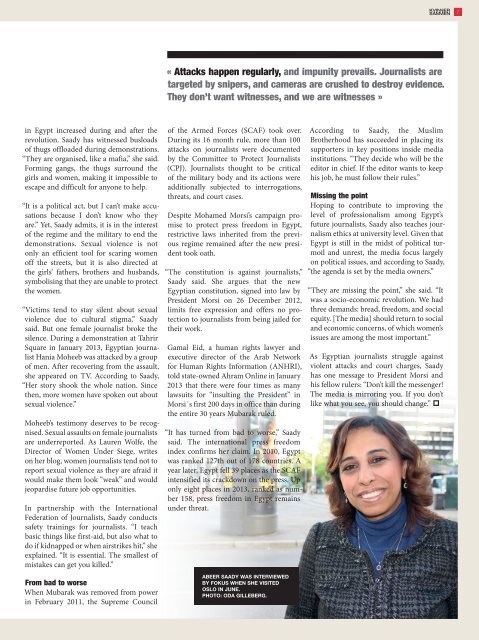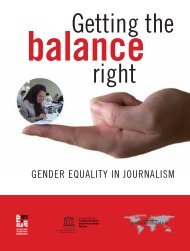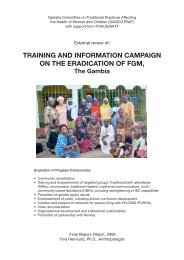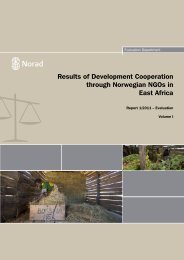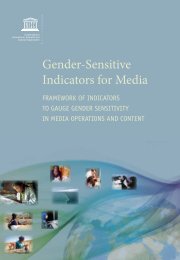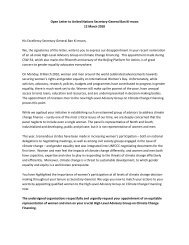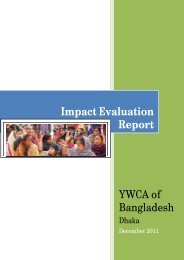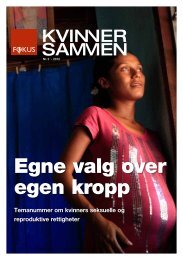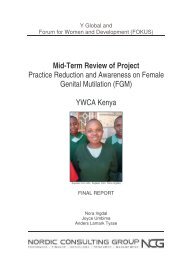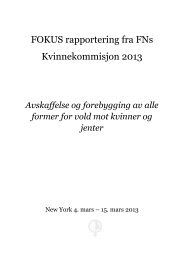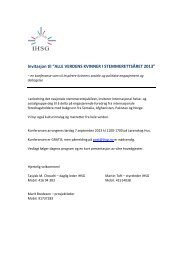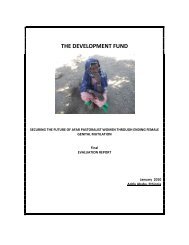Last ned PDF - Fokus
Last ned PDF - Fokus
Last ned PDF - Fokus
- No tags were found...
You also want an ePaper? Increase the reach of your titles
YUMPU automatically turns print PDFs into web optimized ePapers that Google loves.
7« Attacks happen regularly, and impunity prevails. Journalists aretargeted by snipers, and cameras are crushed to destroy evidence.They don’t want witnesses, and we are witnesses »in Egypt increased during and after therevolution. Saady has witnessed busloadsof thugs offloaded during demonstrations.“They are organised, like a mafia,” she said.Forming gangs, the thugs surround thegirls and women, making it impossible toescape and difficult for anyone to help.“It is a political act, but I can’t make accusationsbecause I don’t know who theyare.” Yet, Saady admits, it is in the interestof the regime and the military to end thedemonstrations. Sexual violence is notonly an efficient tool for scaring womenoff the streets, but it is also directed atthe girls’ fathers, brothers and husbands,symbolising that they are unable to protectthe women.“Victims tend to stay silent about sexualviolence due to cultural stigma,” Saadysaid. But one female journalist broke thesilence. During a demonstration at TahrirSquare in January 2013, Egyptian journalistHania Moheeb was attacked by a groupof men. After recovering from the assault,she appeared on TV. According to Saady,“Her story shook the whole nation. Sincethen, more women have spoken out aboutsexual violence.”Moheeb’s testimony deserves to be recognised.Sexual assaults on female journalistsare underreported. As Lauren Wolfe, theDirector of Women Under Siege, writeson her blog, women journalists tend not toreport sexual violence as they are afraid itwould make them look “weak” and wouldjeopardise future job opportunities.In partnership with the InternationalFederation of Journalists, Saady conductssafety trainings for journalists. “I teachbasic things like first-aid, but also what todo if kidnapped or when airstrikes hit,” sheexplai<strong>ned</strong>. “It is essential. The smallest ofmistakes can get you killed.”From bad to worseWhen Mubarak was removed from powerin February 2011, the Supreme Councilof the Armed Forces (SCAF) took over.During its 16 month rule, more than 100attacks on journalists were documentedby the Committee to Protect Journalists(CPJ). Journalists thought to be criticalof the military body and its actions wereadditionally subjected to interrogations,threats, and court cases.Despite Mohamed Morsi’s campaign promiseto protect press freedom in Egypt,restrictive laws inherited from the previousregime remai<strong>ned</strong> after the new presidenttook oath.“The constitution is against journalists,”Saady said. She argues that the newEgyptian constitution, sig<strong>ned</strong> into law byPresident Morsi on 26 December 2012,limits free expression and offers no protectionto journalists from being jailed fortheir work.Gamal Eid, a human rights lawyer andexecutive director of the Arab Networkfor Human Rights Information (ANHRI),told state-ow<strong>ned</strong> Ahram Online in January2013 that there were four times as manylawsuits for “insulting the President” inMorsi´s first 200 days in office than duringthe entire 30 years Mubarak ruled.“It has tur<strong>ned</strong> from bad to worse,” Saadysaid. The international press freedomindex confirms her claim. In 2010, Egyptwas ranked 127th out of 178 countries. Ayear later, Egypt fell 39 places as the SCAFintensified its crackdown on the press. Uponly eight places in 2013, ranked as number158, press freedom in Egypt remainsunder threat.Abeer Saady was interviewedby FOKUS when she visitedOslo in June.Photo: Oda Gilleberg.According to Saady, the MuslimBrotherhood has succeeded in placing itssupporters in key positions inside mediainstitutions. “They decide who will be theeditor in chief. If the editor wants to keephis job, he must follow their rules.”Missing the pointHoping to contribute to improving thelevel of professionalism among Egypt’sfuture journalists, Saady also teaches journalismethics at university level. Given thatEgypt is still in the midst of political turmoiland unrest, the media focus largelyon political issues, and according to Saady,“the agenda is set by the media owners.”“They are missing the point,” she said. “Itwas a socio-economic revolution. We hadthree demands: bread, freedom, and socialequity. [The media] should return to socialand economic concerns, of which women’sissues are among the most important.”As Egyptian journalists struggle againstviolent attacks and court charges, Saadyhas one message to President Morsi andhis fellow rulers: “Don’t kill the messenger!The media is mirroring you. If you don’tlike what you see, you should change.”


